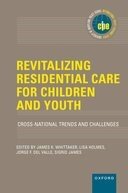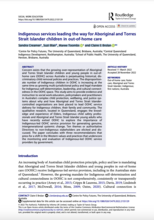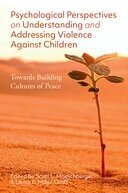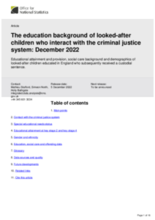Displaying 1341 - 1350 of 14555
The authors review data about LGBTQIA+ youth in care and describe two European programs that are striving to provide a secure, welcoming, and affirming living environment for LGBTQIA+ youth in child welfare systems.
This is the monthly update of the Eastern and Southern Africa Regional Learning Platform published in December 2022.
This study aims to provide evidence and instruction to social work educators, policymakers and practitioners
in Australia’s child protection, wellbeing, and justice systems about why and how Aboriginal and Torres Strait Islander controlled organizations are best placed to lead out-of-home care service delivery for Indigenous children, their family and community.
This chapter in the book, "Psychological Perspectives on Understanding and Addressing Violence Against Children: Towards Building Cultures of Peace", explores how violence impacts children in various types of alternative care from larger scale institutions such as orphanages to family-based care models like foster care. The book explores the topic from a global perspective.
This analysis conducted by the UK Office for National Statistics explores the education and social care background of care-experienced young people in England who were imprisoned at any point up to the age of 24 years.
Children in care are 10 times more likely to end up in prison by the time they reach 24 than those who grew up outside the system, official figures suggest. The study by the Office for National Statistics (ONS) published today found that looked-after children were more at risk of coming into contact with the criminal justice system during early adulthood than their peers.
Human rights experts in a Harvard Law School panel on Wednesday discussed how the United Nations has responded to violations of children's rights during global armed conflict. The panelists examined the UN’s attempts to hold governments and non-state actors accountable for rights violations.
Department for Education’s (DfE) statistics on looked-after children in England, released earlier this month, showed the number of unaccompanied children in care grew by 1,430 in the year to March 2022, surpassing the overall increase of 1,390 in the care population. The latter rose for the 14th consecutive year, by 2%, to 82,170.
Queensland child safety authorities have quietly ditched a "racially biased" decision-making tool that had been widely used for years. The move came on the back of preliminary findings from a Queensland expert comparing the tool's accuracy across Indigenous and non-Indigenous children. The tool, known as the Structured Decision Making model, was used to rate children on their risk of harm and help authorities decide whether to intervene.
Olena Merzliakova, a psychologist and Ph.D. in Psychology, shared effective and simple tips for parents. She is one of the experts engaged for the EU-funded hotline established this summer by the UNDP.





